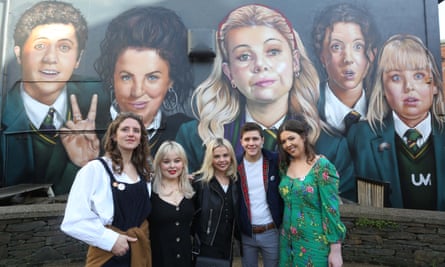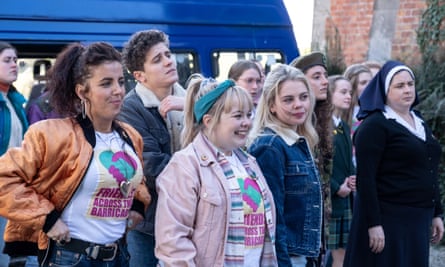In Derry, Saoirse-Monica Jackson’s face is painted across a wall, several metres high, alongside the four other lead cast members of Derry Girls. The mural was unveiled earlier this year to celebrate the second season of the Channel 4 hit comedy, and has been warmly received by residents of the Northern Irish city. They are, it seems, proud of how Lisa McGee’s series has put Derry in the spotlight – and for a more positive reason than those usually depicted in the city’s murals, which traditionally focused on the Troubles.
When I ask Jackson – who grew up in Derry – what she makes of it, she has almost no words, just about managing to say “amazing”.
“I’d love to have a more articulate answer,” she says apologetically, “but there’s a mural in my home town after this show – who could have imagined that would have happened?”
Starring in Derry Girls has been life-changing for its young star – who at 25 is more than a decade older than the schoolgirl she plays. The sitcom is set in the mid-90s, and follows Jackson’s character Erin, her space cadet cousin Orla (Louisa Harland), the nervy Clare (Nicola Coughlan), the man-hungry, vodka-thirsty Michelle (Jamie-Lee O’Donnell) and Michelle’s bemused English cousin James (Dylan Llewellyn), as they navigate the usual trials of being a teenager – as well as the more particular ones of growing up Catholic during the Troubles. But whether they’re burning down chip shops, offending Protestant boys on bridge-building courses, or decapitating religious icons, the girls (and James) reliably get up to all sorts of trouble of their own.
Derry Girls has been a huge hit: the first series was Channel 4’s biggest comedy launch in 14 years, the most watched TV series in Northern Ireland since records began in 2002, and has been picked up by Netflix, giving it an international audience. Following such success isn’t always easy – but only two episodes into the second series, a deafening buzz has built: five-star reviews (the Guardian calling it “hysterically funny and occasionally profoundly moving”), social-media adoration, and 3.2 million viewers for the first episode.

And no wonder. Derry Girls is a tonic: frank, rude, bracingly unsentimental, and very, very funny. “It portrays Derry so well,” says Jackson. “Yes, we have a harsh sense of humour, and Lisa really does go there. People are mental in Derry: they will just tell you exactly what they think.” The girls are casually and hilariously cruel or dismissive – and the parents even worse (“you can’t ring Childline every time your mother threatens to kill you”) – but underneath there’s huge affection and loyalty. Watching it, you fall in love with the girls, their parents, even the brutally withering Sister Michael, who runs their convent school.
Jackson always had a good feeling about the second series; just reading the scripts had her in stitches. And she’s been able to enjoy filming more: “Honestly, the first time around I was in a state of shellshock, and just scared.”
As Erin, she’s become famous for her contorted facial expressions – snub nose wrinkled, lips curled, eyes rolling to suggest unfettered contempt, lust, or the deep sense of injustice central to being a teenager. In person, Jackson is unsurprisingly rather more contained: quick to smile and laugh, but also thoughtful, even cautious.
“I’m definitely still finding my way as an actor and as a young woman,” she says. Later, she’ll confess a love for writing poetry almost shyly – a far cry from the fearless Erin, who in the latest episode spouts her self-penned doggerel with dogged self-belief.
But Jackson insists she has the best gang to help her find her way: the on-screen chemistry between the Derry girls is as strong in real life. “They are good craic! They are funny, and confident, and they’re very comfortable with who they are. I would say more so than me.”

Before the show, Jackson had nine months without acting work, selling HelloFresh recipe boxes door-to-door in London. She still has a severe case of impostor syndrome. “I know everybody feels this – especially girls – but I’m scared that I’m going to get found out, they’re going to say that they’ve changed their mind.”
Still, she’s quick to point out she’s not had it too hard: since graduating from Arden School of Theatre in Manchester and moving to London she’s had plenty of work, on stage (including Jez Butterworth’s mega-hit The Ferryman in the West End) as well as on screen. And her parents – her mother a counsellor and her father an engineer – always supported her, although “it was real tough love”. Her mother insisted she got her A-levels in Derry; after that, Jackson headed to the Arden, picked because it had a comedy module.
So comedy was always what she was drawn to? “I don’t know if I ever thought my skills lay there, but it was definitely something I wanted to dabble in,” she says. Derry Girls has been more of a total immersion – with Jackson committed to throwing herself into the physical, slapstick side of the show.
From The Young Ones to The Inbetweeners, there’s a long tradition of young men being grotesque, or just gross, in comedy. We rarely see this with young women. Does she think there’s still a pressure to appear pouting and perfect? “I do, 100%,” nods Jackson. “I’m sure it’s going to be difficult on my next job, because I’m so used to having a double chin on this one! I’m not saying that we’re not beautiful, we are” – she breaks off to laugh loudly at herself – “but we’re not scared to be real. In those heightened moments of comedy, we’re not scared to be ugly and distort our faces.”
Still, the Derry girls don’t have to worry about their gurning expressions or fashion faux pas (gloriously recognisable to anyone who was a teenage girl in the 90s) being preserved for ever on Instagram. “There’s so much more pressure on young women now,” Jackson agrees. “It must be so hard to be 13, seeing the format of what is perceived to be beautiful.”
She finds social media tricky. “I’m definitely scared on Twitter. I’m a bit better on Instagram, but not great – and I actually feel the pressure of that.” She hears that Instagram followings of young actors are now considered in casting decisions. “That, to me, is just so gross. What is the difference, then, between us and a Love Island contestant?”
Derry Girls has also been acclaimed for providing a fresh perspective on Northern Ireland. When Jackson goes back now, people in bars shake her hand. But she also finds that they often feel compelled to share their own recollections from the Troubles. “Sometimes they’re not funny stories. Sometimes they’re not funny stories at all.” Jackson pauses. “But sometimes they are very funny.”
And the Troubles are a frequent source of comedy in Derry Girls, from Erin’s auntie moaning that bomb scares are interfering with her tanning salon appointment to Michelle lusting after Orange marchers (“there’s something really sexy about the fact that they hate us so much”). Nothing is so serious that you can’t take the piss out of it. That’s the way it was growing up, Jackson recalls. There was a checkpoint at the end of her road, British soldiers on the streets. “You either laugh or you cry, don’t you? People made a joke about it, and that’s all you can do really.”

She also talks about the “Ma culture” of Derry, the very strong and funny women bred by the Troubles. “There’s a real sense of generosity in Derry, because people don’t have a lot – but they remember when we had nothing, and so they’re willing to help each other.” The scene where Erin’s ma washes all the girls’ uniforms while they stand about in their knickers is, she says, bang on.
Ma culture also meant you couldn’t get away with anything: “If you weren’t caught by your own mum you were going to be caught by someone else’s. Our parents formed this tight-knit group, like sergeant majors.” But it also resulted in Jackson having the biggest fan club. When she did a production of Of Mice and Men in Edinburgh in 2016, 42 people flew over to watch.
The conversation turns, inevitably, to Brexit. Jackson is anxious about what it might mean for Northern Ireland. “It would be absolutely mental for that border to be reinstated,” she says. “Nobody wants to be divided again. Even if you did want a border for political reasons, you don’t want a border [because] it’s bloody inconvenient!” The only good thing about Brexit has been that it’s shone a light on Northern Ireland, she says, and some of the inconsistencies of its political situation: gay marriage and abortion are still illegal, for instance.
Since being on Netflix, the show has certainly brought Derry to the attention of the wider world – even if viewers have struggled with the accent, watching with subtitles. “If there’s anything I’m proud of it’s the fact that we’ve made the word ‘ride’ universal,” says Jackson, laughing at the thought of teenagers worldwide adopting the Northern Irish designation for sexual attractiveness.
More seriously though, it does give her hope that the show has been “taken to people’s hearts” everywhere from Brazil to Canada. “I think that has to do with the fact that it’s funny young women. The world is ready for this now, and happy days – because we’re not going anywhere.”
Derry Girls is on Channel 4 on Tuesday nights. The first series is available on channel4.com









